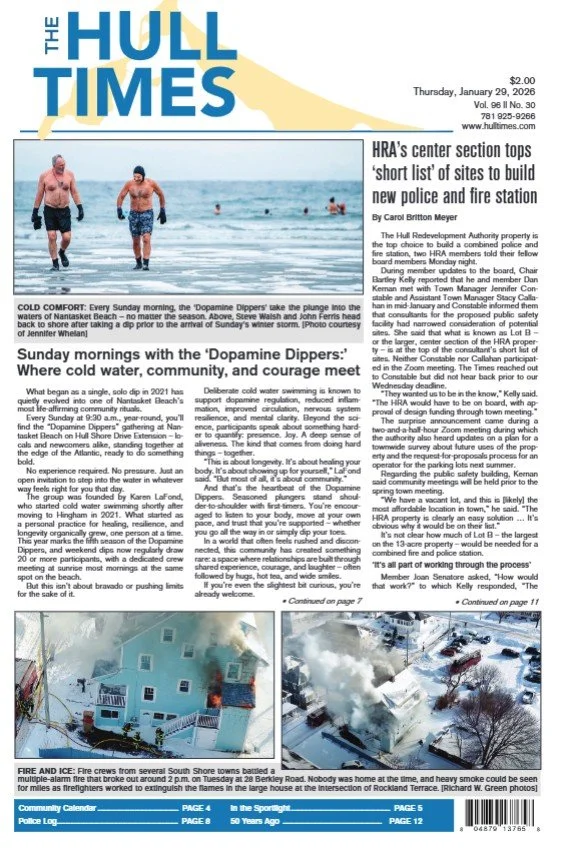Legislators outline fiscal benefits for Hull’s schools in current state budget
/By Carol Britton Meyer
State Sen. Patrick O’Connor and State Rep. Joan Meschino visited the school committee this week to provide an update on the Fiscal 2023 state budget and possible impacts on the Hull Public Schools, including additional education funds and an extension of free school lunches for all students.
RAPPING WITH OUR REPS. State Rep. Joan Meschino and state Sen. Patrick O’Connor met with the school committee on Monday night to deliver an update on the current state budget and educational spending priorities on Beacon Hill. [Courtesy photo]
“Massachusetts is going through a time of tremendous prosperity, with resources to deploy in our communities to tackle different challenges,” O’Connor said. “Hopefully, more of these will be deployed in the area of education to help Hull students achieve everything they want to in their educational careers.”
Overall, education “is still recovering from the pandemic,” he said. “I know that [experience] wasn’t easy, and I want to express my appreciation to the school committee [for their efforts].”
The FY23 state education budget includes $1.8 billion for the early education and care sector, while there’s a Student Opportunity Act balance of $500 million.
The SOA ushered in a new phase in the state’s commitment to ensuring that every student has the benefit of high-quality learning opportunities that lead to success in school, including at the postsecondary level.
“The SOA is a gamechanger [for economically-challenged school districts],” O’Connor said. “We’d like to continue to build on that success, especially in the gray areas where communities don’t meet the economic metrics but are struggling.”
For FY23, $6 billion was allocated to public schools through Chapter 70 funding (an increase of $495 million over FY22). Hull’s share of this education funding is $3.95 million, or a 1.26% increase over FY22.
In addition, $110 million is included in the current fiscal year’s state budget for a year-long extension of universal school meals (allowing every student who wants or needs a school breakfast or lunch to receive it at no cost to their family).
Local aid to Hull includes $2.5 million for Unrestricted General Government Aid, representing a 5.26% increase over FY22.
Local Hull causes also benefitted in the FY23 budget – $20,000 for the Campbell Christmas Angels program; $20,000 to the Hull Lifesaving Museum; and $20,000 for the Noreen Deady Memorial Fund, which aids children who are experiencing serious medical issues or have lost a parent, sibling, or caretaker or faced some other hardship in life.
Local funding that benefitted the Town of Hull also included $3 million for repair of the Nantasket Avenue seawall.
Hull causes that benefitted from Economic Development Bill funding included Wellspring Multi-Service Center, $25,000; Friends of Hull Scouting, $25,000; and the Anne M. Scully Senior Center, $25,000.
The Hull Public Schools received $122,779 in federal Elementary and Secondary School Emergency Relief (ESSER I) funding and $274,746 in ESSER II funding. In addition, $962,051 in ESSER III funding was allocated, with $112,405 claimed to date.
The ESSER grants are a federal program administered by the Department of Education in response to the COVID19 pandemic. The program provides emergency financial assistance to public school districts across the country.
In another update, Meschino noted that genocide education legislation has been signed into law, relating to educating students on genocide and human rights in response to growing concerns regarding antisemitic incidents in the Commonwealth.
This legislation requires all middle and high schools in the state to include instruction on the history of genocide. The Genocide Education Trust Fund will be used for the instruction of students on the history of genocide and to ensure the development of related curricular materials, as well as to provide professional development training to assist educators in the teaching of genocide.
While overall supportive of the concept of genocide education, School Committee Chair Stephanie Peters expressed concern that “our teachers are hanging by a thread. I love the idea, but I hope there’s also a balance with what’s already included in the curriculum,” she said.
Peters also referred to the number of costly unfunded mandates imposed on school districts.
“Everyone’s plates are overflowing, especially our teachers’,” she said. “There are only so many hours in a day to do things.”
Meschino responded that Peters’ point was “well taken.”
The Mental Health Act, which O’Connor called “a hallmark piece of legislation” was also signed into law. This act addresses barriers to care, implements a 988 hotline for emergency assistance, initiates a public awareness campaign, mandates coverage, and eliminates prior authorization for mental health acute treatment and stabilization services for adults and children.
It also stablishes an Office of Behavioral Health Promotion, increases access to care for those in school and individuals in geographically-located areas, and creates a roadmap for access to culturally competent care.
The goal of culturally competent health care services is to provide the highest quality of care to every patient, regardless of race, ethnicity, cultural background, English proficiency, or literacy.
Meschino also explained other legislation of interest, including an Act Relative to Educator Diversity, which did not pass this session. However, it was reported out favorably and is now with the House Ways and Means Committee.
“If passed, the act would establish alternative certifications for aspiring teachers, create an educator data dashboard, require districts to appoint officers or teams to set plans and ensure compliance, and create an educator diversity grant fund,” Meschino said.
Although this law hasn’t passed yet, a new $15 million line item was included in the FY23 budget focused on supporting teachers of color.
At the end of the presentation, Meschino noted that both her office and O’Connor’s provide constituent services, including helping people access resources and “navigate state government,” and encouraged members of the community to reach out to either office for help.
“We’re here for the community,” she said.
Peters expressed appreciation for the assistance both legislators provide to the Hull Public Schools and the town.












